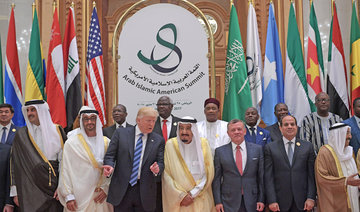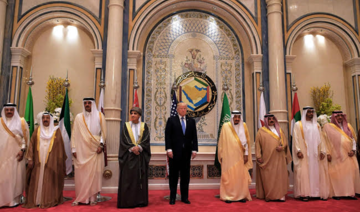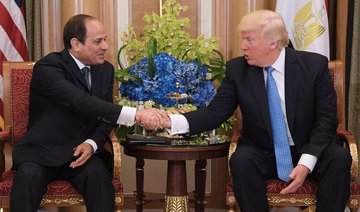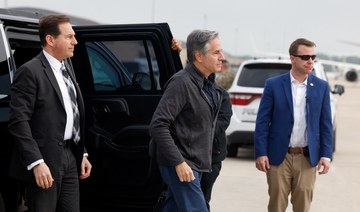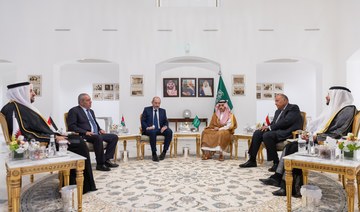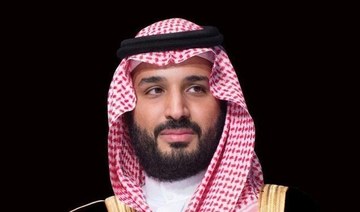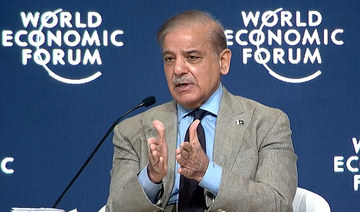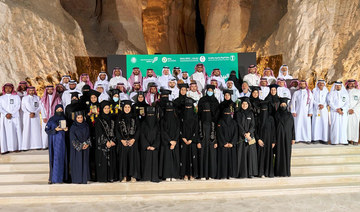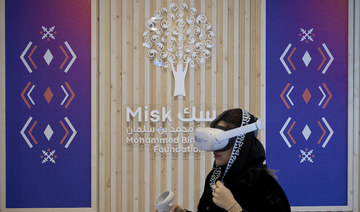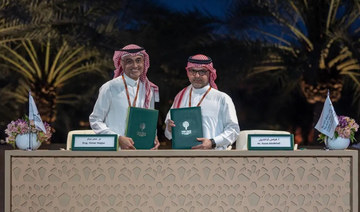I want to thank King Salman for his extraordinary words, and the magnificent Kingdom of Saudi Arabia for hosting today’s summit. I am honored to be received by such gracious hosts. I have always heard about the splendor of your country and the kindness of your citizens, but words do not do justice to the grandeur of this remarkable place and the incredible hospitality you have shown us from the moment we arrived.
You also hosted me in the treasured home of King Abdulaziz, the founder of the Kingdom who united your great people. Working alongside another beloved leader – American President Franklin Roosevelt – King Abdulaziz began the enduring partnership between our two countries. King Salman: your father would be so proud to see that you are continuing his legacy – and just as he opened the first chapter in our partnership, today we begin a new chapter that will bring lasting benefits to our citizens.
Let me now also extend my deep and heartfelt gratitude to each and every one of the distinguished heads of state who made this journey here today. You greatly honor us with your presence, and I send the warmest regards from my country to yours. I know that our time together will bring many blessings to both your people and mine.
I stand before you as a representative of the American People, to deliver a message of friendship and hope. That is why I chose to make my first foreign visit a trip to the heart of the Muslim world, to the nation that serves as custodian of the two holiest sites in the Islamic Faith.
In my inaugural address to the American People, I pledged to strengthen America’s oldest friendships, and to build new partnerships in pursuit of peace. I also promised that America will not seek to impose our way of life on others, but to outstretch our hands in the spirit of cooperation and trust.
Our vision is one of peace, security, and prosperity—in this region, and in the world.
Our goal is a coalition of nations who share the aim of stamping out extremism and providing our children a hopeful future that does honor to God.
And so this historic and unprecedented gathering of leaders—unique in the history of nations—is a symbol to the world of our shared resolve and our mutual respect. To the leaders and citizens of every country assembled here today, I want you to know that the United States is eager to form closer bonds of friendship, security, culture and commerce.
For Americans, this is an exciting time. A new spirit of optimism is sweeping our country: in just a few months, we have created almost a million new jobs, added over 3 trillion dollars of new value, lifted the burdens on American industry, and made record investments in our military that will protect the safety of our people and enhance the security of our wonderful friends and allies – many of whom are here today.
Now, there is even more blessed news I am pleased to share with you. My meetings with King Salman, the Crown Prince, and the Deputy Crown Prince, have been filled with great warmth, good will, and tremendous cooperation. Yesterday, we signed historic agreements with the Kingdom that will invest almost $400 billion in our two countries and create many thousands of jobs in America and Saudi Arabia.
This landmark agreement includes the announcement of a $110 billion Saudi-funded defense purchase – and we will be sure to help our Saudi friends to get a good deal from our great American defense companies. This agreement will help the Saudi military to take a greater role in security operations.
We have also started discussions with many of the countries present today on strengthening partnerships, and forming new ones, to advance security and stability across the Middle East and beyond.
Later today, we will make history again with the opening of a new Global Center for Combating Extremist Ideology – located right here, in this central part of the Islamic World.
This groundbreaking new center represents a clear declaration that Muslim-majority countries must take the lead in combatting radicalization, and I want to express our gratitude to King Salman for this strong demonstration of leadership.
I have had the pleasure of welcoming several of the leaders present today to the White House, and I look forward to working with all of you.
America is a sovereign nation and our first priority is always the safety and security of our citizens. We are not here to lecture—we are not here to tell other people how to live, what to do, who to be, or how to worship. Instead, we are here to offer partnership – based on shared interests and values – to pursue a better future for us all.
Here at this summit we will discuss many interests we share together. But above all we must be united in pursuing the one goal that transcends every other consideration. That goal is to meet history’s great test—to conquer extremism and vanquish the forces of terrorism.
Young Muslim boys and girls should be able to grow up free from fear, safe from violence, and innocent of hatred. And young Muslim men and women should have the chance to build a new era of prosperity for themselves and their peoples.
With God’s help, this summit will mark the beginning of the end for those who practice terror and spread its vile creed. At the same time, we pray this special gathering may someday be remembered as the beginning of peace in the Middle East – and maybe, even all over the world.
But this future can only be achieved through defeating terrorism and the ideology that drives it.
Few nations have been spared its violent reach.
America has suffered repeated barbaric attacks – from the atrocities of September 11th to the devastation of the Boston Bombing, to the horrible killings in San Bernardino and Orlando.
The nations of Europe have also endured unspeakable horror. So too have the nations of Africa and even South America. India, Russia, China and Australia have been victims.
But, in sheer numbers, the deadliest toll has been exacted on the innocent people of Arab, Muslim and Middle Eastern nations. They have borne the brunt of the killings and the worst of the destruction in this wave of fanatical violence.
Some estimates hold that more than 95 percent of the victims of terrorism are themselves Muslim.
We now face a humanitarian and security disaster in this region that is spreading across the planet. It is a tragedy of epic proportions. No description of the suffering and depravity can begin to capture its full measure.
The true toll of ISIS, Al Qaeda, Hezbollah, Hamas, and so many others, must be counted not only in the number of dead. It must also be counted in generations of vanished dreams.
The Middle East is rich with natural beauty, vibrant cultures, and massive amounts of historic treasures. It should increasingly become one of the great global centers of commerce and opportunity.
This region should not be a place from which refugees flee, but to which newcomers flock.
Saudi Arabia is home to the holiest sites in one of the world’s great faiths. Each year millions of Muslims come from around the world to Saudi Arabia to take part in the Hajj. In addition to ancient wonders, this country is also home to modern ones—including soaring achievements in architecture.
Egypt was a thriving center of learning and achievement thousands of years before other parts of the world. The wonders of Giza, Luxor and Alexandria are proud monuments to that ancient heritage.
All over the world, people dream of walking through the ruins of Petra in Jordan. Iraq was the cradle of civilization and is a land of natural beauty. And the United Arab Emirates has reached incredible heights with glass and steel, and turned earth and water into spectacular works of art.
The entire region is at the center of the key shipping lanes of the Suez Canal, the Red Sea, and the Straits of Hormuz. The potential of this region has never been greater. 65 percent of its population is under the age of 30. Like all young men and women, they seek great futures to build, great national projects to join, and a place for their families to call home.
But this untapped potential, this tremendous cause for optimism, is held at bay by bloodshed and terror. There can be no coexistence with this violence. There can be no tolerating it, no accepting it, no excusing it, and no ignoring it.
Every time a terrorist murders an innocent person, and falsely invokes the name of God, it should be an insult to every person of faith.
Terrorists do not worship God, they worship death.
If we do not act against this organized terror, then we know what will happen. Terrorism’s devastation of life will continue to spread. Peaceful societies will become engulfed by violence. And the futures of many generations will be sadly squandered.
If we do not stand in uniform condemnation of this killing—then not only will we be judged by our people, not only will we be judged by history, but we will be judged by God.
This is not a battle between different faiths, different sects, or different civilizations.
This is a battle between barbaric criminals who seek to obliterate human life, and decent people of all religions who seek to protect it.
This is a battle between Good and Evil.
When we see the scenes of destruction in the wake of terror, we see no signs that those murdered were Jewish or Christian, Shia or Sunni. When we look upon the streams of innocent blood soaked into the ancient ground, we cannot see the faith or sect or tribe of the victims – we see only that they were Children of God whose deaths are an insult to all that is holy.
But we can only overcome this evil if the forces of good are united and strong – and if everyone in this room does their fair share and fulfills their part of the burden.
Terrorism has spread across the world. But the path to peace begins right here, on this ancient soil, in this sacred land.
America is prepared to stand with you – in pursuit of shared interests and common security.
But the nations of the Middle East cannot wait for American power to crush this enemy for them. The nations of the Middle East will have to decide what kind of future they want for themselves, for their countries, and for their children.
It is a choice between two futures – and it is a choice America CANNOT make for you.
A better future is only possible if your nations drive out the terrorists and extremists.
For our part, America is committed to adjusting our strategies to meet evolving threats and new facts. We will discard those strategies that have not worked—and will apply new approaches informed by experience and judgment. We are adopting a Principled Realism, rooted in common values and shared interests.
Our friends will never question our support, and our enemies will never doubt our determination. Our partnerships will advance security through stability, not through radical disruption. We will make decisions based on real-world outcomes – not inflexible ideology. We will be guided by the lessons of experience, not the confines of rigid thinking. And, wherever possible, we will seek gradual reforms – not sudden intervention.
We must seek partners, not perfection—and to make allies of all who share our goals.
Above all, America seeks peace – not war.
Muslim nations must be willing to take on the burden, if we are going to defeat terrorism and send its wicked ideology into oblivion.
The first task in this joint effort is for your nations to deny all territory to the foot soldiers of evil. Every country in the region has an absolute duty to ensure that terrorists find no sanctuary on their soil.
Many are already making significant contributions to regional security: Jordanian pilots are crucial partners against ISIS in Syria and Iraq. Saudi Arabia and a regional coalition have taken strong action against Houthi militants in Yemen. The Lebanese Army is hunting ISIS operatives who try to infiltrate their territory. Emirati troops are supporting our Afghan partners. In Mosul, American troops are supporting Kurds, Sunnis and Shias fighting together for their homeland. Qatar, which hosts the U.S. Central Command, is a crucial strategic partner. Our longstanding partnership with Kuwait and Bahrain continue to enhance security in the region. And courageous Afghan soldiers are making tremendous sacrifices in the fight against the Taliban, and others, in the fight for their country.
As we deny terrorist organizations control of territory and populations, we must also strip them of their access to funds. We must cut off the financial channels that let ISIS sell oil, let extremists pay their fighters, and help terrorists smuggle their reinforcements.
I am proud to announce that the nations here today will be signing an agreement to prevent the financing of terrorism, called the Terrorist Financing Targeting Center – co-chaired by the United States and Saudi Arabia, and joined by every member of the Gulf Cooperation Council. It is another historic step in a day that will be long remembered.
I also applaud the Gulf Cooperation Council for blocking funders from using their countries as a financial base for terror, and designating Hezbollah as a terrorist organization last year. Saudi Arabia also joined us this week in placing sanctions on one of the most senior leaders of Hezbollah.
Of course, there is still much work to do.
That means honestly confronting the crisis of Islamist extremism and the Islamist terror groups it inspires. And it means standing together against the murder of innocent Muslims, the oppression of women, the persecution of Jews, and the slaughter of Christians.
Religious leaders must make this absolutely clear: Barbarism will deliver you no glory – piety to evil will bring you no dignity. If you choose the path of terror, your life will be empty, your life will be brief, and YOUR SOUL WILL BE CONDEMNED.
And political leaders must speak out to affirm the same idea: heroes don’t kill innocents; they save them. Many nations here today have taken important steps to raise up that message. Saudi Arabia’s Vision for 2030 is an important and encouraging statement of tolerance, respect, empowering women, and economic development.
The United Arab Emirates has also engaged in the battle for hearts and souls—and with the U.S., launched a center to counter the online spread of hate. Bahrain too is working to undermine recruitment and radicalism.
I also applaud Jordan, Turkey and Lebanon for their role in hosting refugees. The surge of migrants and refugees leaving the Middle East depletes the human capital needed to build stable societies and economies. Instead of depriving this region of so much human potential, Middle Eastern countries can give young people hope for a brighter future in their home nations and regions.
That means promoting the aspirations and dreams of all citizens who seek a better life – including women, children, and followers of all faiths. Numerous Arab and Islamic scholars have eloquently argued that protecting equality strengthens Arab and Muslim communities.
For many centuries the Middle East has been home to Christians, Muslims and Jews living side-by-side. We must practice tolerance and respect for each other once again—and make this region a place where every man and woman, no matter their faith or ethnicity, can enjoy a life of dignity and hope.
In that spirit, after concluding my visit in Riyadh, I will travel to Jerusalem and Bethlehem, and then to the Vatican – visiting many of the holiest places in the three Abrahamic Faiths. If these three faiths can join together in cooperation, then peace in this world is possible – including peace between Israelis and Palestinians. I will be meeting with both Israeli Prime Minister Benjamin Netanyahu and Palestinian President Mahmoud Abbas.
Starving terrorists of their territory, their funding, and the false allure of their craven ideology, will be the basis for defeating them.
But no discussion of stamping out this threat would be complete without mentioning the government that gives terrorists all three—safe harbor, financial backing, and the social standing needed for recruitment. It is a regime that is responsible for so much instability in the region. I am speaking of course of Iran.
From Lebanon to Iraq to Yemen, Iran funds, arms, and trains terrorists, militias, and other extremist groups that spread destruction and chaos across the region. For decades, Iran has fueled the fires of sectarian conflict and terror.
It is a government that speaks openly of mass murder, vowing the destruction of Israel, death to America, and ruin for many leaders and nations in this room.
Among Iran’s most tragic and destabilizing interventions have been in Syria. Bolstered by Iran, Assad has committed unspeakable crimes, and the United States has taken firm action in response to the use of banned chemical weapons by the Assad Regime – launching 59 tomahawk missiles at the Syrian air base from where that murderous attack originated.
Responsible nations must work together to end the humanitarian crisis in Syria, eradicate ISIS, and restore stability to the region. The Iranian regime’s longest-suffering victims are its own people. Iran has a rich history and culture, but the people of Iran have endured hardship and despair under their leaders’ reckless pursuit of conflict and terror.
Until the Iranian regime is willing to be a partner for peace, all nations of conscience must work together to isolate Iran, deny it funding for terrorism, and pray for the day when the Iranian people have the just and righteous government they deserve.
The decisions we make will affect countless lives.
King Salman, I thank you for the creation of this great moment in history, and for your massive investment in America, its industry and its jobs. I also thank you for investing in the future of this part of the world.
This fertile region has all the ingredients for extraordinary success – a rich history and culture, a young and vibrant people, a thriving spirit of enterprise. But you can only unlock this future if the citizens of the Middle East are freed from extremism, terror and violence.
We in this room are the leaders of our peoples. They look to us for answers, and for action. And when we look back at their faces, behind every pair of eyes is a soul that yearns for justice.
Today, billions of faces are now looking at us, waiting for us to act on the great question of our time.
Will we be indifferent in the presence of evil? Will we protect our citizens from its violent ideology? Will we let its venom spread through our societies? Will we let it destroy the most holy sites on earth? If we do not confront this deadly terror, we know what the future will bring—more suffering and despair. But if we act—if we leave this magnificent room unified and determined to do what it takes to destroy the terror that threatens the world—then there is no limit to the great future our citizens will have.
The birthplace of civilization is waiting to begin a new renaissance. Just imagine what tomorrow could bring.
Glorious wonders of science, art, medicine and commerce to inspire humankind. Great cities built on the ruins of shattered towns. New jobs and industries that will lift up millions of people. Parents who no longer worry for their children, families who no longer mourn for their loved ones, and the faithful who finally worship without fear.
These are the blessings of prosperity and peace. These are the desires that burn with a righteous flame in every human heart. And these are the just demands of our beloved peoples.
I ask you to join me, to join together, to work together, and to FIGHT together— BECAUSE UNITED, WE WILL NOT FAIL.
Thank you. God Bless You. God Bless Your Countries. And God Bless the United States of America.
Full text of President Trump's speech in Saudi Arabia
Full text of President Trump's speech in Saudi Arabia
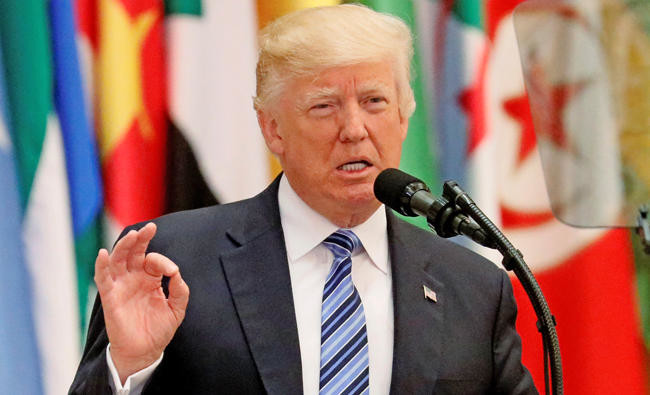
GCC holds Gulf-US Joint Ministerial Meeting to advance regional security
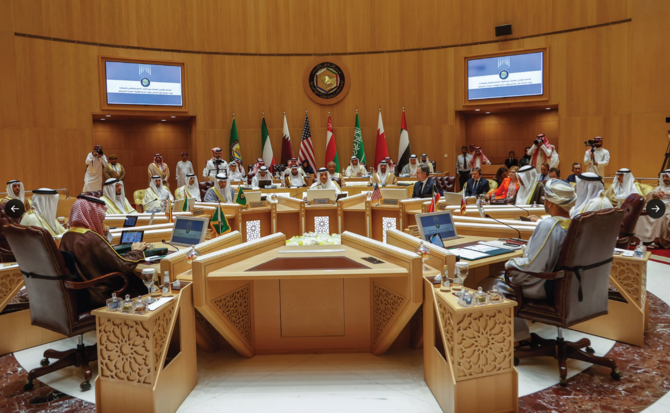
- In Riyadh, Blinken is expected to meet with senior Saudi leaders and hold a wider meeting with counterparts from five Arab states
RIYADH: Secretary Anthony Blinken participated in a joint US-Gulf Cooperation Council ministerial meeting to advance coordination on regional security on Monday in Riyadh.
“There really are two paths forward for the region as a whole. One driven with division with destruction, with violence with permanent insecurity. The other, greater integration, greater security, greater peace,” Secretary Anthony Blinken said.
“ I think the region today shows that many more of us want to pursue that affirmative path, and I’m grateful to our colleagues in the GCC for working in partnership to advance in that direction,” he added.
During his opening remarks, Secretary Blinken expressed that the meeting serves as an opportunity to advance efforts to promote greater stability in this region.
Blinken arrived in Riyadh Monday morning as a part of a 3-day visit from April 29-May 1 to meet with regional partners.
The secretary highlighted that in the upcoming days as he travels to Jordan and Palestine he will meet with humanitarian groups and the Israeli governemnt to discuss the developments in Gaza.
During his remarks Secretary Blinken highlighted the current U.S. interventions such as the increased value of aid delivered to Gaza and the building of the US maritime corridor.
“It is not enough we still need to get more aid in and around Gaza,” he explained.
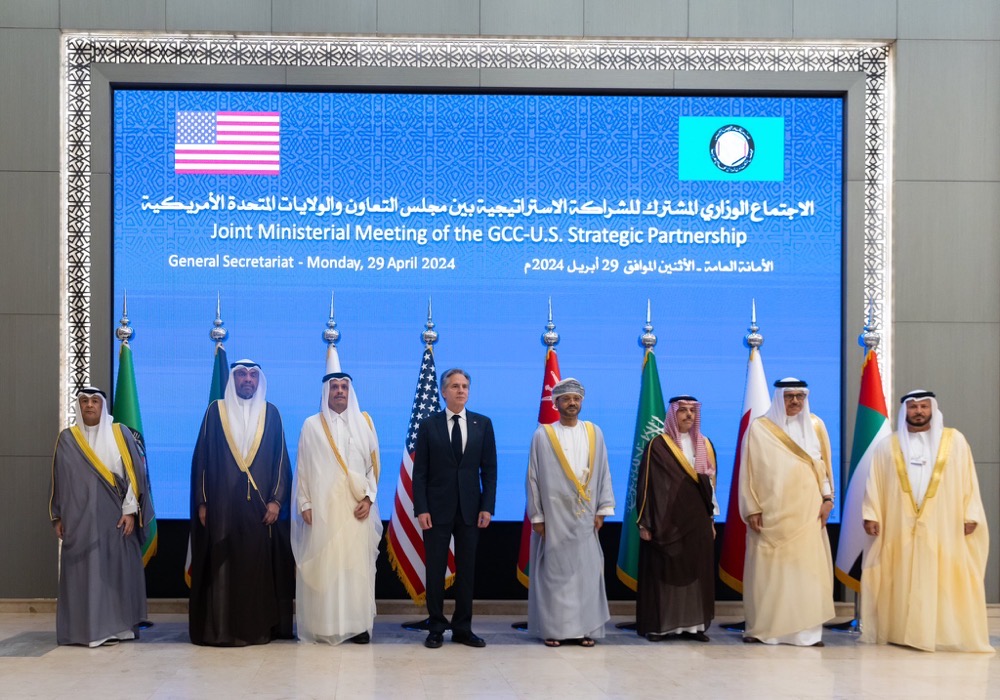
During his speech, Blinken underlines that the U.S. will continue to work with its GCC partners to “build just and lasting peace.”
“We are focused on addressing the greatest threat to regional stability and regional security, Iran,”
“ This is the first meeting since Iran’s unprecedented attack on Israel, The first direct attack from Iran to Israel with more than 300 projectiles including over 100 holistic missiles," Blinken explained.
Blinken underlined that the attacks from Iran stress the importance of working together in integrated defense.
He highlighted that this will be the discussion topic in the upcoming US-GCC meeting in a few weeks on integrated air, militry defense and maritime security.
The other discussion topic underlined by Blinken was the “ ways to preserve freedom of navigation in the Red Sea,”
“The Houthi attacks not only undermine security but they undermine the lives and livelihoods of people throughout the region including in Yeman, the very people they profess they want to represent, The cost of goods have gone up, and it’s harder to get things into Yemen, to the north we’re people so desperately need it,”
“This needs to stop and we are being resolute in doing everything we can to put a stop to it,” Blinken sid.
During his opening remarks, the GCC Secretary-General Jassim Al-Budaiwi called for an immediate ceasefire in Gaza and called for an international conference on implementing a two-state solution.
He also underlined the need for effective international measures to end the violence in the West Bank.
He also expressed the importance of ensuring the security of relief corridors for the delivery of humanitarian aid.
Al-Budaiwi emphasized that the continuous escalation between Iran and Israel threatens the security and stability of the region.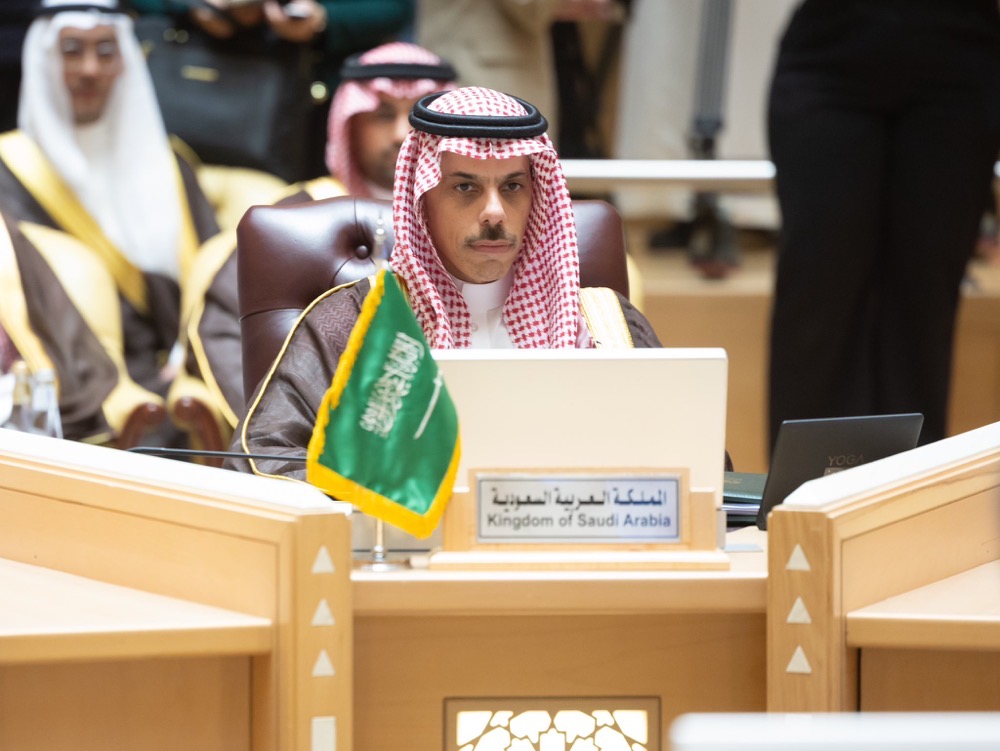
The GCC Secretary General also expressed concern over the Houthi attacks on the Red Sea.
Following his visit to the Kingdom, Blinken will be meeting with counterparts in Jordan and Palestine.
As a part of his visit, the secretary will discuss various topics including the ongoing efforts to achieve a ceasefire in Gaza that secures the release of hostages.
Other topics in the meetings will include humanitarian aid to Gaza, limiting the spillover of conflict and ongoing efforts to achieve regional security.
A pathway to an independent Palestinian state with security guarantees for Israel will also be one of the topics of discussion during his visit.
On the sidelines of the meeting, The Saudi Minister of foreign affairs, Prince Faisal bin Farhan met with Secretary Blinken. The two discussed the developments in the Gaza Strip, the importance of a ceasefire, efforts to ensure entry of urgent humanitarian aid, and joint efforts.
Saudi FM discusses two-state solution with French, Turkish counterparts
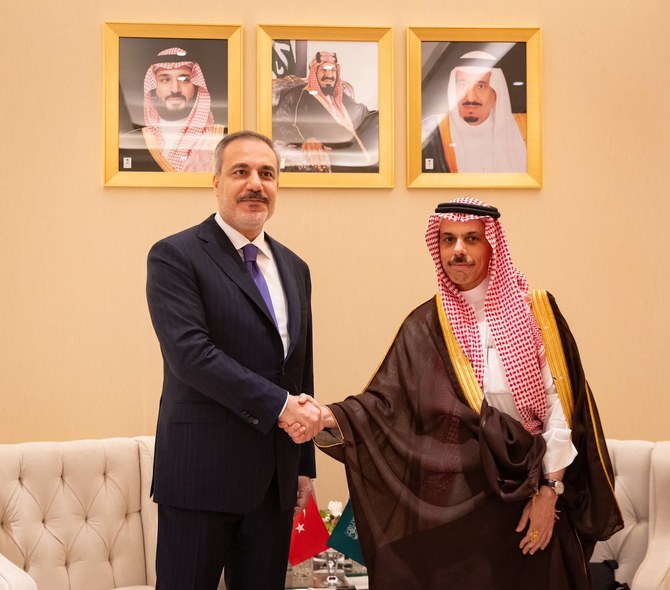
- The discussions took place on the sidelines of a ministerial consultative meeting to discuss Gaza war
RIYADH: Saudi Foreign Minister Prince Faisal bin Farhan held talks with his French and Turkish counterparts on Monday.
The discussions took place on the sidelines of a ministerial consultative meeting of the six-party Arab Committee to discuss developments in the Gaza war, the Saudi Press Agency reported.
Talks with Hakan Fidan of Turkiye and Stephane Sejourne focused on coordinating efforts to advance the two-state solution and acknowledge the Palestinian state, SPA added.
Saudi crown prince receives world officials after WEF special meeting in Riyadh
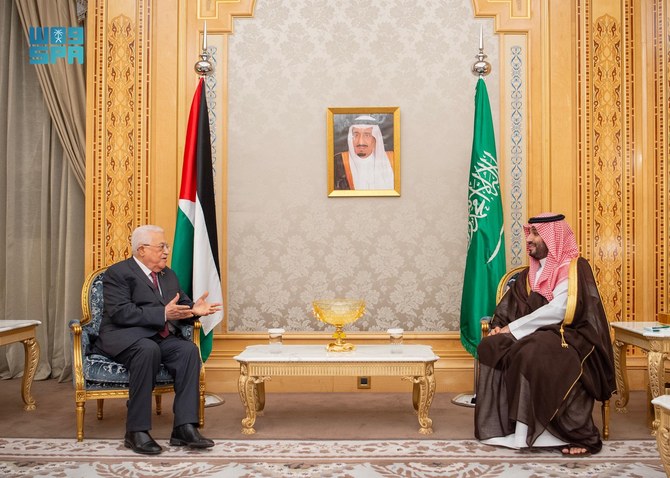
- Two-day special meeting of the World Economic Forum ended on Monday
RIYADH: Saudi Crown Prince Mohammed bin Salman received officials from around the world in Riyadh after a special meeting of the World Economic forum ended on Monday.
The officials included Palestinian President Mahmoud Abbas, US Secretary of State Antony Blinken, British Foreign Secretary David Cameron, the Prime Minister of Malaysia Anwar Ibrahim, and the Prime Minister of Pakistan Shehbaz Sharif.
The officials attended the two-day special meeting during which the crown prince called for global collaboration to help build a more resilient and integrated global economy.
Blinken is visiting the Kingdom on his seventh trip to the Middle East since the Oct. 7 Hamas attack on Israel, which responded with a relentless offensive in Gaza that has drawn global criticism.
Saudi Arabia, UNEP launch World Environment Day campaigns
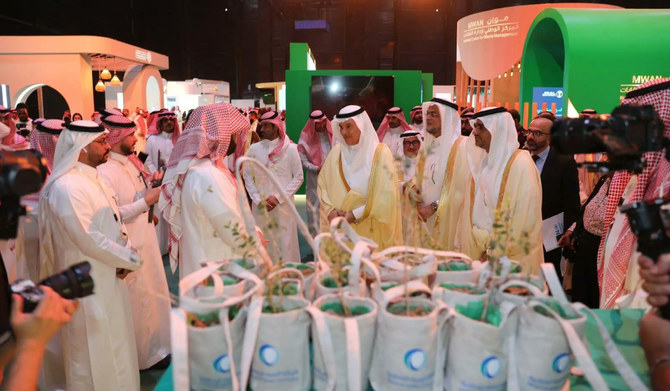
- Faqeeha noted that on the occasion of World Environment Day, Saudi Arabia will shed light on the urgent need for global investments in conserving nature, restoring lands, and working toward sustainability
RIYADH: Saudi Arabia and the UN Environment Programme have announced campaigns to combat desertification, restore ecosystems, and strengthen drought resilience ahead of World Environment Day celebrations on June 5 in Riyadh.
The announcement was made at the opening of Saudi Arabia’s Environment Week on Sunday, the Saudi Press Agency reported.
Saudi Minister of Environment, Water, and Agriculture Abdulrahman Al-Fadhli inaugurated the annual event that aspires to raise awareness of the importance of environmental protection.
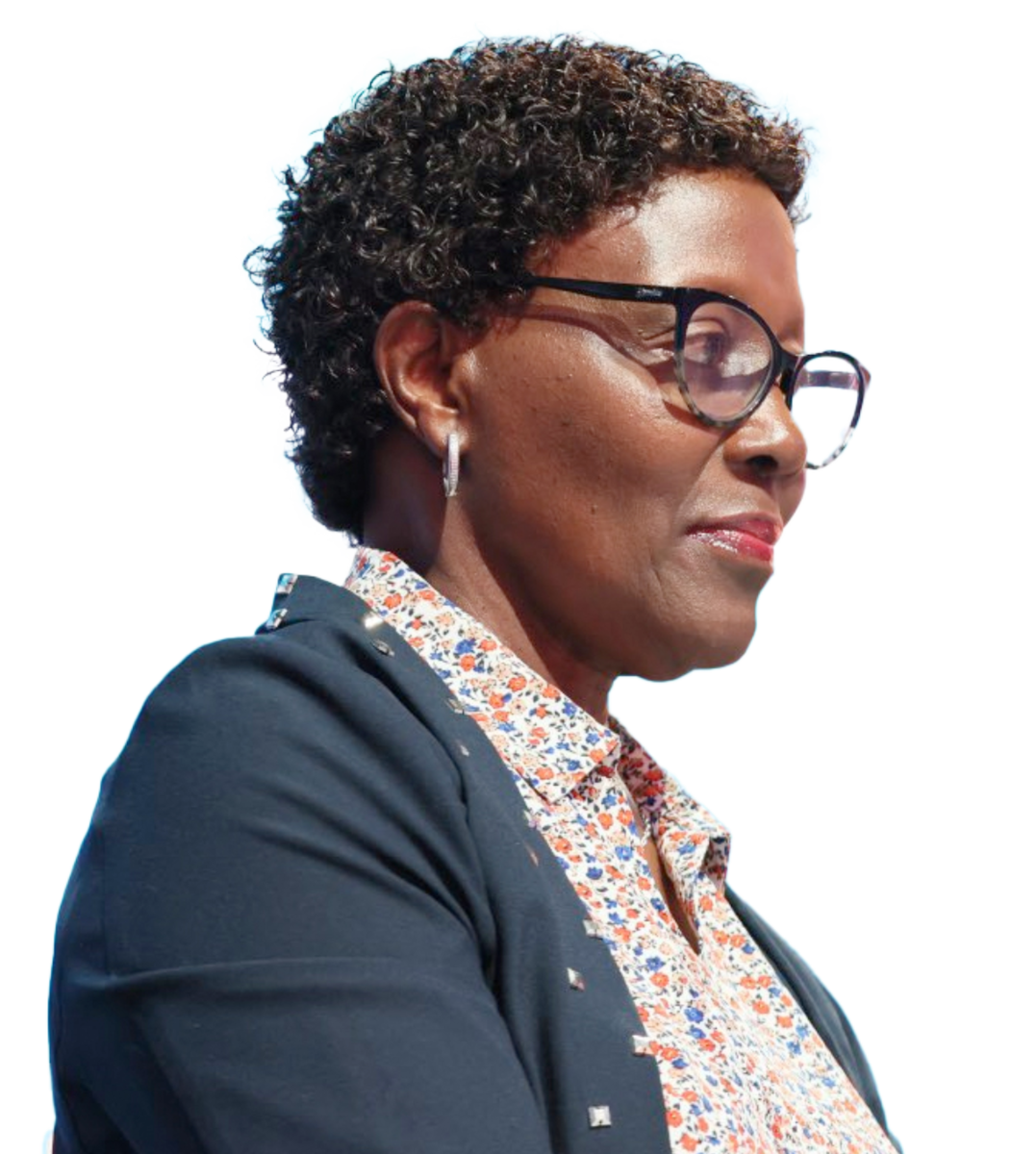
During the event, Deputy Minister for Environment Osama Faqeeha emphasized the shared responsibility in addressing land degradation and combating desertification. This responsibility extends to policymakers, the private sector, and civil society organizations globally, who must work together to restore agricultural areas, rehabilitate land, and tackle desertification and drought, he said.
Faqeeha noted that on the occasion of World Environment Day, Saudi Arabia will shed light on the urgent need for global investments in conserving nature, restoring lands, and working toward sustainability.
This year, we are calling on people — from the grassroots to governments — to help tackle the climate and extinction crisis we face by restoring the ground we depend on for survival.
Elizabeth Mrema, Deputy executive director, UNEP
He highlighted the importance of uniting national and international efforts to safeguard and rehabilitate ecosystems across the globe, aiming to fulfill sustainable development objectives.
“Without action, 95 percent of land on Earth could be degraded within the next 30 years, which could spell disaster for humanity and the planet,” said Elizabeth Mrema, deputy executive director of UNEP, launching the global campaign at a Saudi Environment Week event in Riyadh.
“We have seen how previous campaigns have catalyzed climate action across the globe. This year, we are calling on people — from the grassroots to governments — to help tackle the climate and extinction crisis we face by restoring the ground we depend on for survival,” she added.
Countries worldwide have committed to restoring 1 billion hectares of land, aiming to protect 30 percent of land and sea for nature and restoring 30 percent of the planet’s degraded ecosystems.
Supporting the UN 2030 Agenda for Sustainable Development, World Environment Day 2024 will boost climate action efforts by gathering support for ecosystem restoration.
At the opening event of the Saudi Environment Week, Al-Fadhli emphasized that achieving the goals of environmental protection and conservation of the Kingdom’s natural resources requires active engagement from governmental and private sectors, as well as individuals.
He stressed the significance of adopting eco-friendly behaviors in daily routines and applying these practices across different sectors to reach sustainable development objectives.
“The continuation of this national event annually in the Kingdom reflects our wise leadership’s dedication to environmental protection and commitment to sustainable development, in line with the goals of Saudi Vision 2030,” Al-Fadhli said.
“Moreover, the Kingdom’s dedication to environmental protection is evident at national, regional, and international levels. This is demonstrated by Saudi Arabia’s active participation in numerous environmental agreements and organizations, as well as its … initiatives like the Middle East Green Initiative and other significant global environmental efforts under the G20 umbrella,” he added.
Saudi Leadership Society Council honors new graduates
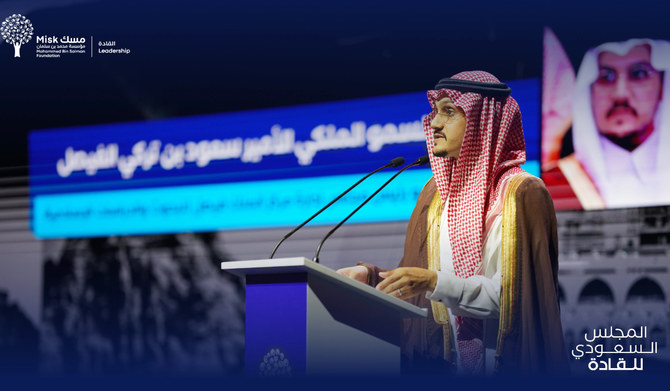
- ‘The Saudi Leadership Society was founded with the aim of providing a dynamic and empowering environment in which future leaders’ contributions to key objectives of Saudi Vision 2030 can be enhanced’
RIYADH: The latest graduates of Saudi Arabia’s Leaders 2030 program and the Misk Fellowship program were honored during the first annual meeting of the Saudi Leadership Society Council.
The graduation ceremony for the third and fourth groups to complete the Leaders 2030 program took place during the meeting, along with the announcement that they will join the council.
Guests at the event, hosted by the Misk Foundation, included Prince Saud bin Turki, adviser to the chairman of the board of directors at the King Faisal Center for Research and Islamic Studies, other members of the royal family, ministers, and members of Misk’s board of directors, the Saudi Press Agency reported on Monday.
The aim of the council is to assemble an exceptional community of ambitious future leaders and harness the diversity of its members to foster cooperation, drive growth and make a significant impact on the country and the world, SPA said.
It also seeks to encourage members to develop as leaders who drive positive change, contribute to the progress and leadership of the Kingdom, enhance its global status, and help achieve the goals of the Saudi Vision 2030 national development and diversification plan. The council is also dedicated to creating new opportunities for sustainable growth and other positive effects.
The Saudi Leadership Society was founded with the aim of providing a dynamic and empowering environment in which future leaders’ contributions to key objectives of Saudi Vision 2030 can be enhanced, officials said, thereby playing a crucial role in shaping the development of the influential leaders of tomorrow.


